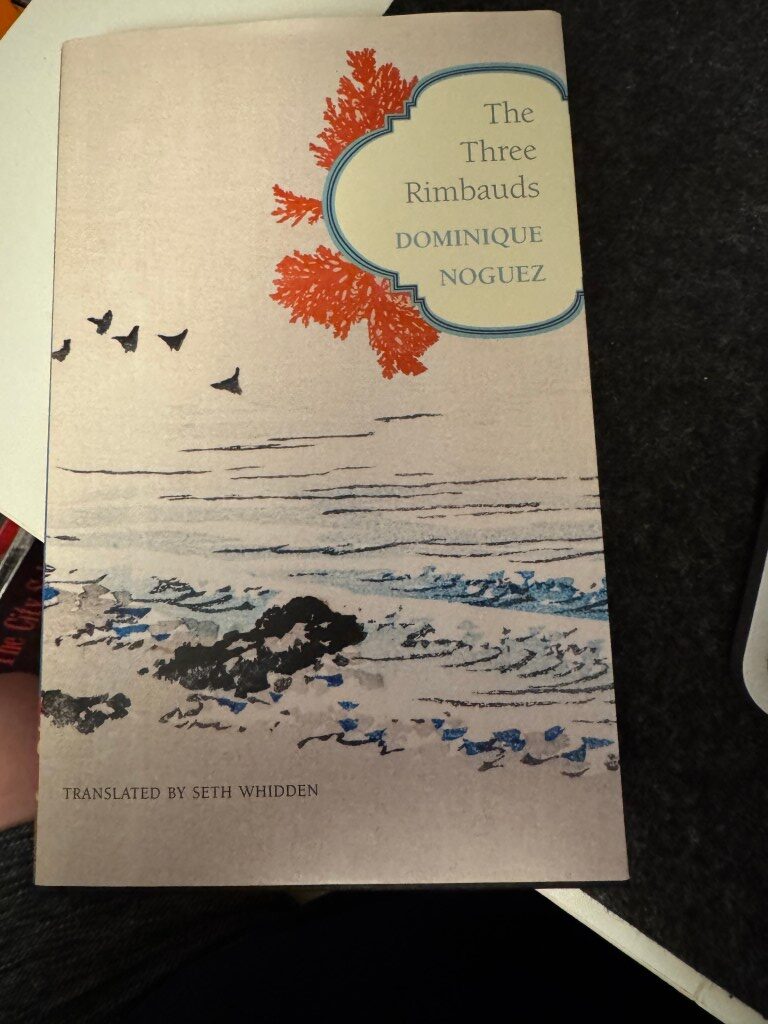
The Three Rimbauds by Dominique Noguez
French Literary criticism
Original title – Les TROIS rIMBAUDS
Translator – Seth Whidden
Source – Personal copy
I looked when Seagull Books had a recent sale, and of the many great books they have, I couldn’t get them all, which, believe me, if I had the chance, I would. This title grabbed me as I was like many young men a Fan of Rimbaud when I was younger. The guy people like Jim Morrison and Bob Dylan said they loved to read. Of course, in a rock and roll way, he died at 39. He had just returned from Africa. The French Lit Critic and film Professor Dominique used this as a launch pad for the book. He had read a piece by Paul Claudel in. the 1912 edition of Rimabud’s complete works. We missed so much of what Rimbaud could have written had he lived.
When Arthur Rimbaud was inducted into the Académie française on 16 January 1930, no one seemed to remember the ‘man with the soles of wind’, the diabolical cherub from ‘Nina’s Replies’ and ‘The Seated Man’, or the Seer thug who had dominated the headlines in the little world of French poetry in 1872. Curiously enough, Paul Valéry, whose speech officially welcomed the new academician and who was known for being more meticulous (in his foreword to La Fontaine or Mallarmé, for example), made quick work of Rimbaud’s early works and dispatched them in three quick sentences:
The opning paragrapgh about the imagined 1930 academy speech
The book centres on another event that happened but was set a year earlier. We imagine Rimbaud has been given a seat in the French Academy. The speech Paul Valery gives teeth to the years we missed of what could have been Rimbaud’s life in 1930.(He gave an actual speech the year after when Marshal Pétain got seat 18 in the Academy). As I say, the speech follows his Life, which Rimbaud had written as solo novel on his return to France and wrote a story called African Nights. This book, and that very French idea, seems to be a piece of Autofiction of his time in Africa. It is imagined that he also married the sister of Paul Claudel. Claudel was a Catholic, and this saw Rimbaud become a Catholic. We see bits of letters to the like of Breton Cocteau, the great writers in France, in the years that followed his death, weaving his imagined life around actual events and people that show a poet that calmed and in the end, his verse became more serious and straightforward. One quote hit me, and this is so true. What would have happened if Gide had died after The Fruits of the Earth or James Joyce after Dubliners ? The question is, what if, like so many other poets, died to you ng, would Wilfred Owen be so well known or loved had he died young?
(It makes for a small literary game, not without interest and worth practicing on others: How would we view Gide if he had died after The Fruits of the Earth; Aragon after the Treatise on Style or Joyce after Dubliners?.. ). No. We will agree, how-ever, that this way of rewriting history has the advantage of revealing, in an ingeniously metaphorical way, that one Rimbaud dies in 1891 to give birth to another.
The thought of what if other writers had diedat a young age like Rimbaud
This is a short book of 60 pages, a homage to a great poet, a little play on what might have been. I was struck by the question of how far we are from the AI works of an Older Rimbaud or Kurt Kobain’s imagined works in this age of AI, an album of what might have been Tracks. I like this idea of what might have been for Rimbaud. He is one of those writers who died on the cusp of his wave. He could have been even more significant, or could he have been? We will never know. I like how he patched the Claudel quote to the speech many years later from someone Rimbaud knew for an Academy seat. The footnotes show how Noguez weaved his web around these and other events to make the imagined latter years of Rimbaud. Of course, this moves into an area that someone like Borges used to write about: reimagining the history of great figures. This is mentioned in the intro.I also thought of a couple of books I read ago by Peter Ackroyd, one about Milton and the other about Oscar Wilde, that imagined part of their lives. In this part, we see the Rimbaud, and no one ever saw the man tinged by North Africa. An event that profoundly affected Rimbaud from what is alluded to in the book. Do you have a favourite fictional or reimagined life of a writer?
Related
Published by








